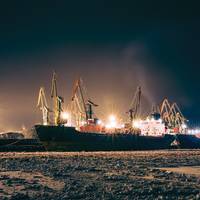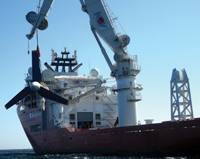Atlantic Offshore Wind: Favorable Winds for Maritime

Now that the United States finally can envision steady winds blowing from the Atlantic Seaboard due to a pipeline of offshore wind farms on the horizon, the maritime industry can finally step up and earn some of the benefits. This includes shipbuilding, port construction, and worker training. This article reviews the key developments and forecasts the growth in maritime jobs.The federal and state governments share responsibility for developing offshore wind farms and bringing the wind into the power grid and…
As Interest in LNG Surges, Regulators Struggle to Keep Pace

The use of Liquefied Natural Gas (LNG) as a transportation fuel for ships, barges and ferries has surged in recent months. This surge is due, in large part, to the boon in the production of natural gas in the U.S.; new low sulfur rules for the North American Emission Control Area (ECA), which go into effect on January 1, 2015; and new technologies for the construction of engines capable of running on LNG. Regulatory regimes both in the U.S. and worldwide are struggling to keep pace with the tremendous growth of LNG as a fuel.
Is the US Prepared to Protect Its Arctic Interests?

The answer to this question is a resounding “no.” The U.S. is not prepared to protect its interests in the Arctic over the next decade. The primary legal regime that is being relied upon by all members of the Arctic fraternity, the Law of the Sea Convention, has not been adopted by the U.S. The operational resources needed to pursue our interests have not been funded and there is currently little prospect that they will be funded in the near future. U.S. interests in the Arctic are vast.
Law of the Sea Treaty Heads Arctic Challenges for U.S.
The melting polar icecap is presenting both opportunities and challenges for the United States and other Arctic nations, as well as other nations with interests in the region. Arctic ice cover has declined consistently over the past few decades. Increased accessibility, dubbed an “emerging maritime frontier” by U.S. Coast Guard Commandant Admiral Robert J. Papp, Jr., presents a host of opportunities for oil and gas development, fishing, tourism, and transportation. It also creates myriad challenges related to Arctic governance, marine safety, indigenous populations, scientific research, and environmental stewardship. This article reviews the state of play regarding claims to the Arctic and the U.S.
Marine Renewable Energy Begins to Take Off in 2012

The U.S. lags behind Europe in the development of offshore wind (OSW) projects in part due to the lack of a mandatory national renewable energy standard and other tax incentives. But, the Obama Administration has set its own voluntary goal of producing 80% of the nation’s electricity from clean sources by 2035. And, various federal agencies have worked diligently to promote new sources of energy, including OSW and tidal and wave energy. This year, we anticipate the first new commercial leases for wind off the Atlantic Seaboard (since Cape Wind)…
BRAZIL: U.S. Find New Opportunities

While the U.S. economy may be in the doldrums, smart U.S. companies are looking increasingly to exports to help their bottom lines. A major market for U.S. exports is Brazil. This article examines new market opportunities in the oil and gas, shipbuilding and port infrastructure in Brazil, and identifies certain financing sources available to U.S. companies seeking to participate in these markets. Brazil’s growth in recent years has been amazing. Over the past 5 years, real GDP growth in Brazil has averaged 4.3% annually (as compared to 1.3% annually in the U.S.), reaching 7.5% in 2010.
Ship Disposal Encounters Enviro, Political Hurdles
By Joan M. Bondareff and Charles T. In 2001, Congress directed the Maritime Administration (MarAd) to dispose of all obsolete vessels in its inventory by September 30, 2006, and to do so "in the manner that provides the best value to the Government." At present, MarAd has 104 non-retention ships not under contract in three locations around the country-James River Reserve Fleet in Virginia, Beaumont Reserve Fleet in Texas, and Suisun Bay Reserve Fleet in California. MarAd is using a variety of ship disposal options, which include domestic and foreign dismantling/recycling to accomplish this directive. Both have been controversial and foreign scrapping has prompted litigation. This article describes what MarAd is doing and what laws are implicated in this mission. The U.S.
Heightened Scrutiny On Ship Scrapping
Ever since two enterprising reporters for the Baltimore Sun decided, in 1997, to take a closer look at ship scrapping, first at a Baltimore shipyard dismantling a Navy ship, and subsequently an in depth review of scrapping conditions in Alang, India, the light of public attention has been shining on this oldest of maritime practices. With this scrutiny, the world of scrapping ships will be forever changed — hopefully for the better. Following the end of the Cold War, the Navy's downsizing its fleet, and the requirement to replace tankers with more modern and environmentally safer ships, the demand to decommission and dispose of obsolete vessels is increasing at a pace more rapid than the capacity exists to handle this demand. Certainly, this is true in the U.
The Abandoned Shipwreck Act: Useful Tool for Preservation or Paper Tiger?
In 1988, Congress enacted the Abandoned Shipwreck Act (Pub. L. 100-298, 43 U.S.C. §§ 2101-2106), in an effort to give states more authority to protect the historical provenance of abandoned shipwrecks in state waters. It was one of the more controversial laws Congress passed that year because it pitted treasure salvors and divers, on the one hand, against states and historic preservationists on the other. In the end, the states won passage of the legislation, but some twelve years later, the question remains whether the Act has had the intended effect. Two significant decisions since 1988 have called into question the law's stated Congressional policy. First, a description of the Act itself.






